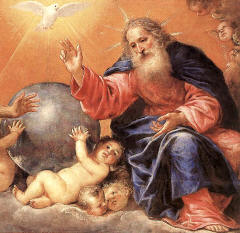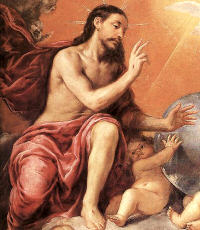
Daily Readings for:June 15, 2014
(Readings on USCCB website)
Collect: God our Father, who by sending into the world the Word of truth and the Spirit of sanctification made known to the human race your wondrous mystery, grant us, we pray, that in profession the true faith, we may acknowledge the Trinity of eternal glory and adore your Unity, powerful in majesty. Through our Lord Jesus Christ, your Son, who lives and reigns with you in the unity of the Holy Spirit, one God, for ever and ever.
RECIPES
ACTIVITIES
o Prayers to the Blessed Trinity
PRAYERS
o Prayer Cards for Easter Grace at Meals
o Book of Blessings: Blessing Before and After Meals: Easter (1st Plan)
o Te Deum
o Litany of the Most Holy Trinity
LIBRARY
o Catechesis on the Holy Trinity | Pope John Paul II
o Christ's Passion Reveals Glory of the Trinity | Pope John Paul II
o Glory of the Trinity in Christ's Ascension | Pope John Paul II
o Glory of the Trinity in the Heavenly Jerusalem | Pope John Paul II
o Glory of the Trinity Is Revealed in History | Pope John Paul II
o Holy Trinity Is Revealed at Jesus' Baptism | Pope John Paul II
o Incarnation Reveals Glory of the Trinity | Pope John Paul II
o Presence of the Trinity in Human Life | Pope John Paul II
o Saints Reflect Infinite Love of Trinity | Pope John Paul II
o The Divine Romance: The Blessed Trinity | Archbishop Fulton J. Sheen
o The Name of the Holy Trinity Is Engraved In the Universe | Pope Benedict XVI
o The Trinity in the Life of the Church | Pope John Paul II
o The Trinity: Fountain of Love and Light | Pope John Paul II
o Trinity Is Mysteriously Present in Creation | Pope John Paul II
o Trinity Is Present in Christ's Resurrection | Pope John Paul II
· Ordinary Time: June 15th
· Solemnity of the Most Holy Trinity
Old Calendar: Trinity Sunday
The fundamental dogma, on which everything in Christianity is based, is that of the Blessed Trinity in whose name all Christians are baptized. The feast of the Blessed Trinity needs to be understood and celebrated as a prolongation of the mysteries of Christ and as the solemn expression of our faith in this triune life of the Divine Persons, to which we have been given access by Baptism and by the Redemption won for us by Christ. Only in heaven shall we properly understand what it means, in union with Christ, to share as sons in the very life of God.
The feast of the Blessed Trinity was introduced in the ninth century and was only inserted in the general calendar of the Church in the fourteenth century by Pope John XXII. But the cultus of the Trinity is, of course, to be found throughout the liturgy. Constantly the Church causes us to praise and adore the thrice-holy God who has so shown His mercy towards us and has given us to share in His life.
Trinity Sunday
The dogma of faith which forms the object of the feast is this: There is one God and in this one God there are three Divine Persons; the Father is God, the Son is God, the Holy Spirit is God. Yet there are not three Gods, but one, eternal, incomprehensible God! The Father is not more God than the Son, neither is the Son more God than the Holy Spirit. The Father is the first Divine Person; the Son is the second Divine Person, begotten from the nature of the Father from eternity; the Holy Spirit is the third Divine Person, proceeding from the Father and the Son. No mortal can fully fathom this sublime truth. But I submit humbly and say: Lord, I believe, help my weak faith.
Why is this feast celebrated at this particular time? It may be interpreted as a finale to all the preceding feasts. All three Persons contributed to and shared in the work of redemption. The Father sent His Son to earth, for "God so loved the world as to give His only-begotten Son." The Father called us to the faith. The Son, our Savior Jesus Christ, became man and died for us. He redeemed us and made us children of God. He ever remains the liturgist par excellence to whom we are united in all sacred functions. After Christ's ascension the Holy Spirit, however, became our Teacher, our Leader, our Guide, our Consoler. On solemn occasions a thanksgiving Te Deum rises spontaneously from Christian hearts.

The feast of the Most Holy Trinity may well be regarded as the Church's Te Deum of gratitude over all the blessings of the Christmas and Easter seasons; for this mystery is a synthesis of Christmas, Epiphany, Easter, Ascension and Pentecost. This feast, which falls on the first Sunday after Pentecost, should make us mindful that actually every Sunday is devoted to the honor of the Most Holy Trinity, that every Sunday is sanctified and consecrated to the triune God. Sunday after Sunday we should recall in a spirit of gratitude the gifts which the Blessed Trinity is bestowing upon us. The Father created and predestined us; on the first day of the week He began the work of creation. The Son redeemed us; Sunday is the "Day of the Lord," the day of His resurrection. The Holy Spirit sanctified us, made us His temple; on Sunday the Holy Spirit descended upon the infant Church. Sunday, therefore, is the day of the Most Holy Trinity.
Excerpted from The Church's Year of Grace, Pius Parsch
Symbols of the Trinity: Equilateral Triange; Circle of Eternity; Three interwoven Circles; Triangle in Circle; Circle within Triangle; Interwoven Circle and Triangle; Two Triangles interwoven in shape of Star of David; Two Triangles in shape of Star of David interwoven with Circle; Trefoil; Trefoil and Triangle; Trefoil with points; Triquetra; Triquetra and circle; Shield of the Holy Trinity; Three Fishes linked together in shape of a triangle; Cross and Triangle overlapping; Fleur de Lys; St. Patrick's Shamrock.
Things to Do:
- Depending on the ages of family members, research symbols of the Trinity and create something for the centerpiece of your family table, or something for your family altar, such as a small banner or poster. It can be as little as a 4 x 6 photograph or something to use every year as a backdrop or wall hanging.
- Think of different foods to serve that can reflect the symbolism of the Trinity. One example is clover leaf rolls. These rolls are formed with three balls of dough put into one hole of the muffin tin for each roll. They are easy to make. Use your favorite roll recipe (you can even buy frozen bread or roll dough), or search on the Internet for one of many examples.
- The Directory on Popular Piety explains some of the pious exercises related to the devotion of the Holy or Blessed Trinity. Three very simple prayers are the Sign of the Cross, Gloria Patri (Glory be to the Father, Son and Holy Spirit, etc.) and the Trisagion (meaning "thrice holy"): "Holy God, Holy Mighty One, Holy Immortal One, Have mercy on us." This is just one version, there are many others, and it is usually found in the Eastern liturgies.